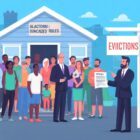Inside Tips: Stopping Eviction From Subsidized Homes

Are you feeling trapped in a web of uncertainty, fearing eviction from your subsidized home? Don’t lose hope!
This article is your guiding light, offering inside tips to stop eviction and reclaim your sense of security. With a clear understanding of your rights and the necessary documentation, along with legal assistance and financial aid options, you can turn the tide.
Let’s navigate this challenging journey together, armed with knowledge and empowered to protect your home.
Key Takeaways
- Understanding your rights and seeking legal assistance specializing in housing issues is crucial in stopping eviction from subsidized homes.
- Gathering necessary documentation such as lease agreements, income verification, proof of subsidy, and rent payment records is important for building a strong defense against eviction.
- Exploring financial assistance options such as the Emergency Rental Assistance Program (ERAP) and reaching out to local organizations providing financial aid can help prevent eviction.
- Utilizing community resources such as local non-profit organizations, workshops on tenant rights, social service agencies, and tenant advocacy groups can provide support and advice in eviction proceedings.
Understand Your Rights
Do you know what rights you have when facing eviction from subsidized homes? It’s important to understand your rights in order to navigate this difficult situation.
First and foremost, you have the right to due process. This means that the landlord must follow the proper legal procedures and provide you with notice of the eviction. They can’t simply kick you out without a valid reason.
Additionally, you have the right to challenge the eviction in court. If you believe that the eviction is unjust or unlawful, you can present your case to a judge who’ll decide whether or not to allow the eviction to proceed.
It’s also important to know that you have the right to seek legal assistance. There are organizations and lawyers who specialize in housing issues and can provide you with the guidance and support you need.
Understanding your rights is crucial in protecting yourself and your home. Now that you know your rights, it’s time to gather the necessary documentation to support your case.
Gather Necessary Documentation
To stop eviction from subsidized homes, start by gathering the necessary documentation. Having the right paperwork can make a significant difference in your case and increase your chances of success. Below is a table outlining the essential documents you should collect:
| Document | Purpose | Where to Obtain |
|---|---|---|
| Lease Agreement | Proves your tenancy and rental obligations | Landlord or housing agency |
| Income Verification | Demonstrates your ability to pay rent | Employer, pay stubs, tax returns |
| Proof of Subsidy | Confirms your eligibility for subsidized housing | Housing agency, subsidy approval letter |
| Rent Payment Records | Shows your payment history and consistency | Bank statements, money order receipts, checks |
Ensure that all documents are up to date and accurate. If you’re missing any, reach out to the appropriate sources and request copies. It’s crucial to keep copies of all paperwork for your records as well as for any legal proceedings.
Seek Legal Assistance
If you’re facing eviction from subsidized housing, it’s crucial to seek legal assistance to protect your rights and navigate the complex legal process. Dealing with eviction can be overwhelming and stressful, but having a lawyer by your side can make a significant difference in your case.
When it comes to eviction, there are specific laws and regulations that govern the process. Legal professionals who specialize in housing and tenant rights understand these laws and can provide you with the guidance you need. They can help you understand your rights as a tenant, review your lease agreement, and determine if your eviction is lawful.
Moreover, seeking legal assistance can help you explore potential defenses to eviction. Your lawyer can assess the circumstances of your case and identify any legal arguments that could be used in your favor. They can also guide you on how to respond to eviction notices and help you prepare for court proceedings.
Additionally, a lawyer can help you negotiate with your landlord or housing authority to find alternative solutions and avoid eviction altogether. They can advocate on your behalf and explore options such as payment plans, mediation, or reasonable accommodations.
Explore Financial Assistance Options
Consider reaching out to local organizations that provide financial assistance to individuals facing eviction from subsidized homes. These organizations understand the challenges you’re facing and are dedicated to helping individuals like you stay in their homes. Financial assistance programs can provide you with the support you need to cover your rent, utilities, and other essential expenses, giving you the breathing room to get back on your feet.
One option to explore is the Emergency Rental Assistance Program (ERAP), which offers funds specifically designed to prevent eviction. This program can provide you with financial aid to cover your rental arrears and future rent payments. Additionally, many local nonprofits and community organizations offer emergency funds and grants to assist individuals in crisis situations. These organizations may have specific eligibility criteria, so it’s important to reach out and inquire about the programs available in your area.
Utilize Community Resources
Take advantage of the resources available in your community to help you navigate through this challenging situation and prevent eviction from your subsidized home. Your community is a valuable source of support and assistance during difficult times. Here are some ways you can utilize these resources:
- Reach out to local non-profit organizations: Many non-profit organizations offer housing assistance programs that can help you with legal advice, mediation services, and financial aid. They understand the unique challenges faced by individuals in subsidized housing and can provide guidance tailored to your situation.
- Attend community workshops and seminars: Keep an eye out for workshops and seminars held in your community that focus on tenant rights, eviction prevention, and financial management. These events can provide you with valuable information and strategies to navigate through the eviction process and maintain your subsidized housing.
- Connect with social service agencies: Social service agencies often have case managers who can help you access resources such as emergency rental assistance, utility bill assistance, and job placement services. They can also provide you with information on local food banks and other essential resources.
- Join tenant advocacy groups: By joining tenant advocacy groups, you can connect with other individuals who are facing similar challenges. These groups can provide support, share experiences, and offer valuable advice on dealing with eviction proceedings and maintaining your subsidized housing.
Frequently Asked Questions
Can I Be Evicted From a Subsidized Home Even if I Have Been Living There for Many Years?
Yes, you can be evicted from a subsidized home even if you’ve lived there for many years. It’s important to understand the specific rules and requirements of your housing program to avoid eviction.
What Are the Consequences if I Fail to Provide the Necessary Documentation Requested by the Housing Authority?
What happens if you don’t provide the requested documents? The consequences can be serious. You may risk eviction from your subsidized home. Make sure to promptly submit all necessary documentation to avoid this outcome.
How Can I Find Affordable Legal Assistance to Help Me With My Eviction Case?
You can find affordable legal assistance for your eviction case by reaching out to local legal aid organizations, contacting pro bono law clinics, or seeking help from tenant advocacy groups. They can provide guidance and support during this difficult time.
Are There Any Financial Assistance Programs Available Specifically for Individuals Facing Eviction From Subsidized Homes?
There are financial assistance programs available for individuals facing eviction from subsidized homes. These programs can provide the support you need to stay in your home and avoid displacement.
What Community Resources Are Available to Help Me Prevent Eviction From My Subsidized Home?
If you’re facing eviction from your subsidized home, there are community resources available to help. From legal aid organizations to housing counseling agencies, they can provide guidance and support to prevent eviction.



